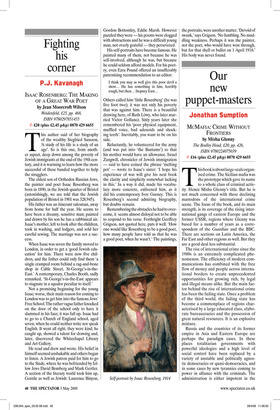Fighting his corner
P.J. Kavanagh
ISAAC ROSENBERG: THE MAKING OF A GREAT WAR POET by Jean Moorcroft Wilson Weidenfeld, £25, pp. 468, ISBN 9780297851455 ✆ £20 (plus £2.45 p&p) 0870 429 6655 This author said of her biography of the wealthy Siegfried Sassoon, ‘A study of his life is a study of an age’. So is this one, from another aspect, deep down among the poverty of Jewish immigrants at the end of the 19th century, and it is warming to learn how the more successful of these banded together to help the strugglers.
The eldest son of Orthodox Russian Jews, the painter and poet Isaac Rosenberg was born in 1890, in the Jewish quarter of Bristol (astonishingly, we are told that the Jewish population of Bristol in 1901 was 328,945).
His father was an itinerant salesman, away from home for half the year. He seems to have been a dreamy, sensitive man; painted and drawn by his son he has a rabbinical air. Isaac’s mother, left to look after the children, took in washing, and lodgers, and sold her careful sewing. The marriage was not a success.
When Isaac was seven the family moved to London, in order to get a ‘good Jewish education’ for him. There were now five children, and the father could only find them ‘a single cramped room behind a rag-and-bone shop in Cable Street, St-George’s-in-theEast.’ A contemporary, Charles Booth, sadly remarked, ‘St-George’s-in-the-East appears to stagnate in a squalor peculiar to itself.’ Not a promising beginning for the young Isaac; worse, their main reason for coming to London was to get him into the famous Jews’ Free School. The rather vague father knocked on the door of the school only to have it slammed in his face; it was full up. Isaac had to go to a Church of England school, aged seven, when he could neither write nor speak English. It went all right, they were kind, he caught up, showed a talent for drawing and, later, discovered the Whitechapel Library and Art Gallery.
He read and drew and wrote. His belief in himself seemed unshakable and others began to listen. A Jewish patron paid for him to go to the Slade, where he was befriended by fellow Jews David Bomberg and Mark Gertler. A section of the literary world took him up, Gentile as well as Jewish: Laurence Binyon, Gordon Bottomley, Eddie Marsh. However puzzled they were — his poems were clogged with abstractions and he was a difficult young man, not overly grateful — they persevered.
His self-portraits have become famous. He painted many of them, not because he was self-involved, although he was, but because he could seldom afford models. For his poetry, even Ezra Pound offered an insufferably patronising recommendation to an editor:
I think you may as well give this poor devil a show... He has something in him, horribly rough, but then... Stepney East...
Others called him ‘little Rosenberg’ (he was five foot two); it was not only his poverty that was against him. There is a beautiful drawing here, of Ruth Löwy, who later married Victor Gollancz. Sixty years later she remembered his ‘poor physical equipment, muffled voice, bad adenoids and shocking teeth’. Inevitably, you want to be on his side.
Reluctantly, he volunteered for the army (and was put into ‘the Bantams’) so that his mother would have an allowance. Israel Zangwill, chronicler of Jewish immigration — said to have coined the phrase ‘melting pot’ — wrote to Isaac’s sister: ‘I hope his experience of war will give his next book the clarity and simplicity somewhat lacking in this.’ In a way it did, made his vocabulary more concrete, enlivened him, as it did his contemporary Ivor Gurney. This is Rosenberg’s second admiring biography, but doubts remain.
Remembering the obstacles he had to overcome, it seems almost disloyal not to be able to respond to his verse. Forthright Geoffrey Grigson, not quoted here, puts it well. ‘How one would like Rosenberg to be a good poet, how many people have told us that he was a good poet, when he wasn’t.’ The paintings, the portraits, were another matter. ‘Devoid of swank,’ says Grigson. ‘No fumbling. No muddling weakness. Perhaps it was the painter, not the poet, who would have won through, but for that shell or bullet on 1 April 1918.’ His body was never found.


















































































 Previous page
Previous page